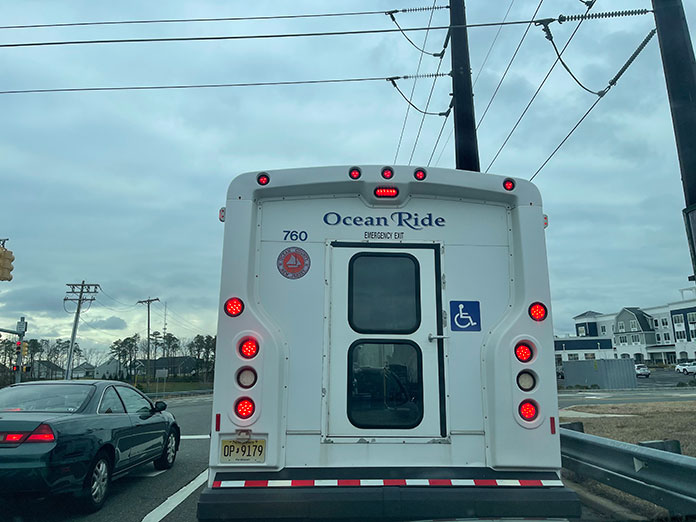
OCEAN COUNTY – The roads are getting older in Ocean County. According to Maria LaFace, Director of Ocean County Senior Services, the Older Americans Act defines a senior as anyone aged 60 or older. Ocean County has around 200,000 seniors, approximately 29.6% of the county’s total population.
At 628 square miles, Ocean County’s residents depend heavily on driving to get around. The growing number of seniors behind the wheel has some advocating for age-based retesting for drivers. Others insist that age is just a number. At least one expert seems to agree.
Dr. Lauren Snedeker, an assistant professor and Director for the Aging and Health Certificate Program at the Rutgers School of Social Work, emphasized the importance of addressing ageism in discussions about elderly drivers.
“It’s really important to recognize how ageism is so pervasive in this world,” Snedeker cautioned. “We really need to make sure that we’re not approaching or considering the decision (to stop someone from driving) simply because of age.”

The Governor’s Highway Safety Association (GHSA) last reviewed state laws regarding mature drivers in March 2024. Currently, 37 states and the District of Columbia have established special provisions for older drivers. These provisions may include increased renewal frequency, restrictions on online or mailed renewals, vision tests, road tests, or reduced or waived renewal fees. States like Illinois and New Hampshire require road tests for drivers 75 and older, while Florida mandates vision tests for drivers over 80.
“New Jersey law does not require any driver retesting based on age,” said MVC spokesman William Connolly.
“The Motor Vehicle Commission has a dedicated medical review process for identifying high-risk drivers who have a medical or physical condition that may prevent them from safely operating a motor vehicle and, if necessary, restricting or taking away their driving privileges. These reviews can happen at any age, ensuring that all drivers, regardless of age, are evaluated for safety. The medical review process is initiated by referrals about a specific driver from physicians, law enforcement, courts, social workers, family members, friends, and other sources. Anonymous reports are not accepted by the MVC,” he said.
For more information about the medical review process, or to report a concern about a driver to the MVC’s Medical Review Unit, visit nj.gov/mvc/drivertopics/medreview.htm.
Referrals can come from doctors, family members, police officers, or even concerned citizens. The MVC’s medical advisory board reviews these cases and can impose restrictions, order re-examinations, or even suspend licenses.
The MVC reports there are several warning signs that could indicate a driver is facing safety issues on the road. These might include failing to follow traffic signals or motor vehicle laws, driving at unusually slow speeds, or having frequent accidents or near misses. Other concerns could involve difficulty reading road signs, feelings of anxiety or fear when driving, or visible, unexplained damage to the vehicle, such as dents, scratches, or missing parts like side mirrors.
More serious concerns arise when there are signs of cognitive or physical impairment. These could include confusion, disorientation, memory issues, or impaired consciousness. Conditions like Alzheimer’s or dementia, neurological disorders such as seizures or blackouts, and sleep-related issues like sleep apnea can all further impact someone’s ability to drive safely.

When To Take The Keys
Having the conversation about whether an elderly family member should stop driving is never an easy one. Sometimes, the person themselves feels it’s time to give up their keys due to advanced age. The decision can be even more challenging for Ocean County residents, where many people rely on their personal vehicle to navigate suburban and rural roads.
Jimmy Cavagnaro of Barnegat remembers the tough moment when he and his wife, Thy, realized they needed to take the car keys from his 80-year-old father. They had tried to hint at the problem before, but his father always dismissed their concerns. He worked as a traveling salesman for decades, driving over 100,000 miles each year. The car was essential to his life and his connection to others.
“We were out to lunch, and my dad told us he had driven the wrong way on Route 9,” Jimmy said. “He thought it was funny, but we knew it was time. We couldn’t let him keep driving and risk him hurting himself or someone else.”
The discussion was challenging. His father, who had Alzheimer’s disease, was physically fit but often unaware of the dangers. For Jimmy, it was important to convey the gravity of the situation. He asked his father, “Is this how you want to be remembered? Do you want your legacy to be that you accidentally killed someone?”
Realizing they needed more support, Thy confided in her father-in-law’s general practitioner during a routine check-up. “I explained the situation and how we needed his help,” she recalled. “It was all set up: we went through the motions of a regular appointment, and I told the doctor what had happened.”
The plan worked perfectly. When the doctor asked Jimmy’s father about the incident, he confirmed it. The doctor was asked if it was safe for him to drive, and he responded, “Absolutely not.” Hearing from a medical professional made the difference in relinquishing the keys.
Snedeker suggested that bringing in a trusted source of knowledge can be incredibly helpful in approaching what she referred to as delicate conversations. Social workers are also well-equipped to coach families and provide a supportive environment. Snedeker encouraged caregivers and family members to recognize the emotions surrounding those in advancing stages of life.
“I urge everyone to approach this conversation not in a punitive way or as if someone is being ganged up on, but rather with sensitivity and empathy,” Snedeker said. “It’s understandable that this is a difficult decision to bring up, and it can be very stressful and disappointing. However, the primary concern should be for the driver’s safety and the safety of others on the road.”
After making the decision, Snedeker advised that removing the car from sight is beneficial whenever possible. Keeping the vehicle readily available can be a constant reminder, which may confuse the individual about why they can’t simply get in and go.
“It’s such a milestone in someone’s life when they get their license at 16 or 17,” reminded Snedeker. “Then it’s a symbol of independence. It’s important that people don’t feel punished for aging or for not being able to function as they once had.”
Transportation Options
Another important consideration is finding alternative solutions for seniors who no longer have access to a personal vehicle. Many older adults may feel isolated and struggle with daily tasks, such as grocery shopping or attending medical appointments. While family members and neighbors can often help, Ocean County Senior Services offers assistance in securing other options.
“As our seniors attempt to age in place, transportation means independence and is a top priority for our office,” LaFace said. “Our department works closely with Ocean Ride to meet the transportation needs of our seniors and has dedicated some Older Americans’ Act funds to our transportation program.”
The Ocean County Department of Transportation Services manages Ocean Ride, which operates 11 bus routes throughout the county. Some routes run three days a week, while others operate less frequently. The Waretown/Barnegat Shoppers Loop is available to Barnegat and Waretown residents.
Ocean Ride offers non-emergency, door-to-door transportation for seniors and adults with disabilities, covering medical appointments, grocery shopping, salons, and more within a 10-mile radius. Reservations are required 2-4 weeks in advance, though limited next-day trips are available based on system capacity.

LaFace said the county partnered with Rutgers University to help educate seniors about public transportation options. They even organized ride-alongs for seniors who wanted to try the bus system, helping them feel more comfortable. New Jersey Transit operates six bus routes that run along major roads throughout Ocean County.
The Senior Services website (co.ocean.nj.us/OC/SeniorServices) provides a link to transportation resources. Seniors living in Brick, Jackson, Lakehurst, Manchester, Stafford, and Toms River have access to local transportation options. Several non-profit organizations also offer ride services that require scheduling. Additionally, the Ocean County Board of Social Services runs a Safe Housing and Transportation Program for eligible residents aged 60 and older who do not drive, offering both medical and non-medical transportation.







